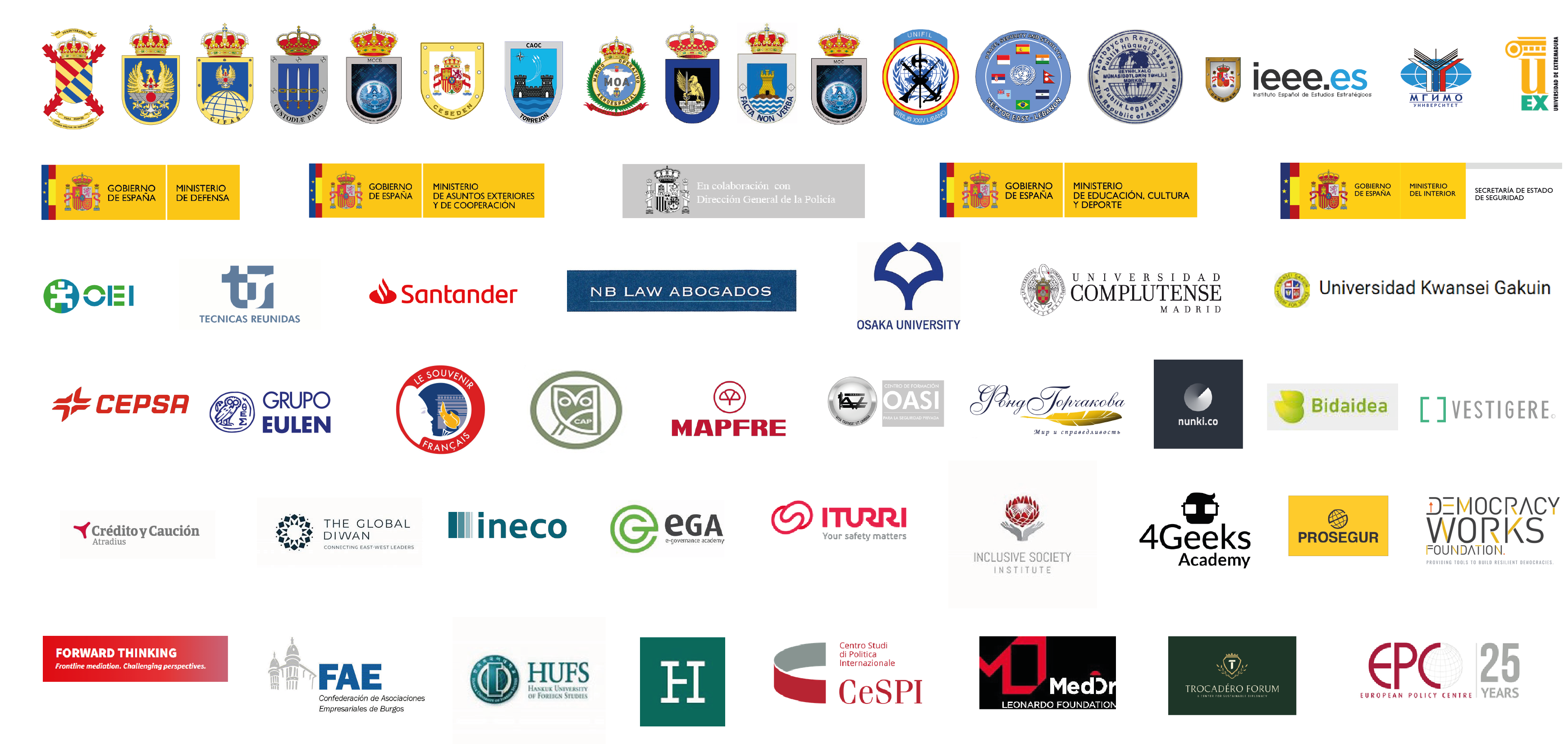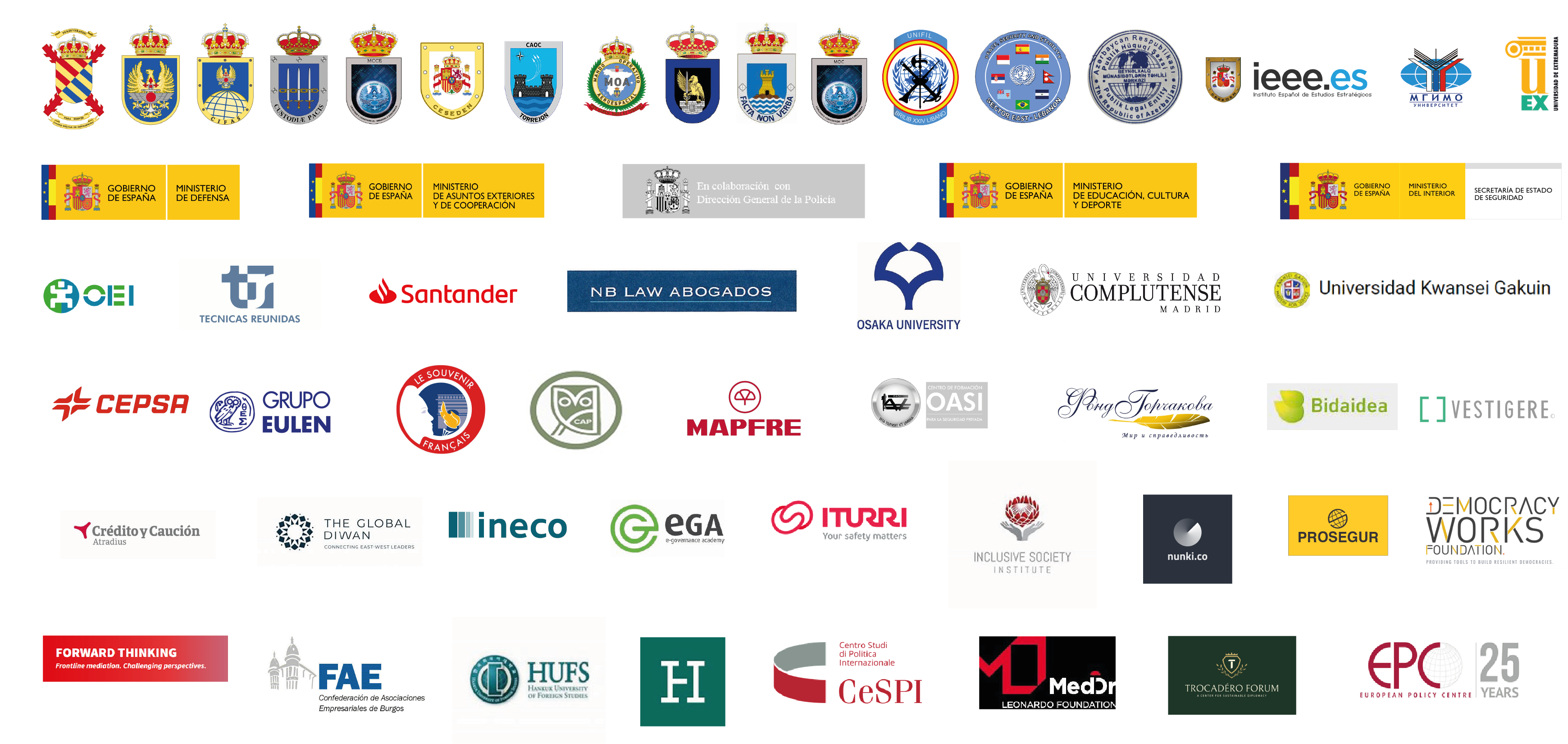
- Introduction
- Who are we
- General Information
- Lesson Plan
- Magisterial Classes
- Field Trips
- Foreign Languages
- Master`s Degree Directed to
- Internships And Carrer Opportunities
- For More Information
Bearing in mind the recent international events, their repercussions, and the needs of professionals, the Foundation for Strategic and International Studies (FESEI) together with all the Ministries, Organizations, Institutions, and Companies which endorse it, initiate the admission process in the Master’s Degree on Leadership, Diplomacy, and Intelligence. Intelligence Analyst Officer – Cyberintelligence Officer.
With the aim of offering future students of the Master’s Degree the best preparation and the highest level of training, including a wide range of languages (English, French, Russian, Farsi, Hebrew), the admission process is opened for the 15th class. Once the student is enrolled, before the academic year has begun, students will immediately initiate their academic training with the “Master’s Degree Preparatory Course” so as to boost their capabilities and skills with no additional costs to the enrolment fees. Their basic knowledge on the techniques, the tools and the methodology of analysis will be developed. Future students will attend seminars and conferences delivered by Ambassadors and experts.
15th Class:
In an increasingly complex and changing world, in the framework where the most important international issues have to be solved through the cooperation of all the States and International organizations, it is necessary for Spain to have an ever-increasing international presence. Therefore, the education of professionals capable of facing the big geostrategic, geopolitical and diplomatic challenges in the fields of Defence, International security, Intelligence, and in the managerial level is very much needed.
With this aim in mind, FESEI, with the participation of CEU-Abat Oliba, private institutions, and as collaborating entities: the Spanish Institute for Strategic Studies (IEEE), the Ministry of Defence, the Ministry of Foreign Affairs, European Union and Cooperation, the Ministry of Home Affairs, and the General Directorate of the National Police, together they have created the Master’s Degree on: “Leadership, Diplomacy and Intelligence. Intelligence Analyst Officer-Cyberintelligence officer.”
Lecture on leadership delivered by Lieutenant General Alcañiz.
Operative-tactical exercise in the Lobos’ River Canyon, Burgos.
Operative-tactical exercise in the Lobos’ River Canyon, Burgos (small groups)
.
Mock anti-terrorist negotiation practice
Urban operative-tactical exercise
Rural operative-tactical exercise
Areas and contents of the Master’s Degree:
-Leadership: theoretical, operative, and tactical.
-Diplomacy: International Relations, International Organizations, International law, Protocol.
-Intelligence – Anti-terrorism – Cybersecurity. Field work (operative-tactical), Situations tests. ISR (Intelligence, Surveillance, and Reconnaissance).
-Geostrategy – Geopolitics – Geohistory.
-Economy.
-Business, economic and competitive intelligence. Project management.
-State Management, and governance.
The Master’s Degree is aimed at:
-Members of the Armed Forces and State Security Forces and Bodies.
-Doctors, doctoral students, and university graduates.
-Corporate executives, and mid-level managers.
-Diplomatic Career students.
-Anyone who might want to start a career in the analysis of the fields of Intelligence, Leadership, Diplomacy, Counterterrorism, Immigrations, and in different State matters.
Administrative data:
-Location where the Master’s Degree is held: Pozuelo de Alarcón (Madrid) and High Performance Centre, Lobos’ River Canyon Natural Park (Burgos).
-Date of commencement: November 2023 (Official Opening Ceremony).
-Completion date: October 2024.
-Limited places. Priority waiting list.
-600 hours. 60 ECTS credits. European Higher Education Area (Bologna Process) – CEU Abat Oliba (Abat Oliba CEU University) + 600 hours. FESEI (Foundation for Strategic and International Studies) Total: 1,200 hours
-Double Degree Enrolment, updated in accordance with Royal Decree 822/2021, of September, 28th, which establishes the organization of university education and the quality assurance procedure.
-Enrolment: 9,984 €.
Further academic training:
-Languages (Arabic, Russian, Hebrew, Farsi, French, and English).
-Paid internship: “Induction internship”.
-Formative trips. Institutional visits.
-Conferences delivered by experts on intelligence, and diplomats (Ambassadors).
-Personalized and specific training with attendance to the tests, aimed at the Diplomatic career, and to access public and private institutions, the Intelligence Community and International organizations.
-Personalized tutoring and follow-up. Career counselling and presentation of CV.
*FESEI: Qualifications and Institutions recognized as being of general interest by the Ministry of Education, Culture and Sport, by a Ministerial Order dated 22/07/13 and Assigned Register Nº 1586. BOE- 2013 – 9077. Foundation for Strategic and International Studies FESEI.
WHO ARE WE?
FESEI is a non-profit organization born with a clear vocational service to our society, with the aim to encourage a security and defense culture, mainly through its institutions: School of High Strategic and International Studies: EEEI, the Statesmen’s School: EE, Intelligence Analysts’ School: EAI and the School of Leadership: ELID. In Spain and in international academic scopes.
Foundation’s aims:
- The promotion of Spain abroad, high quality teaching, studies dissemination, research work, prospective intelligence, publications and international cooperation. In addition to the promotion of the security and defense culture as well as fostering employment directed mainly to our young unemployed people.
- The education of professionals with analytical skills and prospective knowledge, who can be capable of leading organizations and reducing uncertainty, as it is more and more demanded in the fields of the economy, defense and security, both at national and international level, and in the economic and managerial intelligence fields.
The Foundation organizes:
Master’s degree in “Leadership, Diplomacy and Intelligence. Intelligence Analyst Officer”.
Elaboration of Strategic Prospective Intelligence reports; in the managerial, economic, financial, political and social fields.
Agreements and Cooperation with public institutions and companies, in order to organize internships for our students.
High education courses directed to managers, intermediate managers and officials, in Spanish, French, English, Russian and Arabic.
Prospective research in collaboration with national and international university centers and institutions.
Courses, workshops, conferences, debates and round tables on diverse teaching aspects as: leadership, economic and managerial intelligence, cyberterrorism and cyber-security, prospective intelligence, international economy, graphology, geopolitical and geo-strategy affairs.
*Instituciones y Títulos reconocidos de interés general por el Ministerio de Educación, Cultura y Deporte, mediante orden ministerial de fecha 22/07/13 y Registro asignado 1586: FESEI-EEEI-EE. BOE 2013-9077.
GENERAL INFORMATION
– Place of completion of the Master: Pozuelo de Alarcón (Madrid) and High Performance Center, Operational-Tactical. Cañón del Río Lobos Natural Park. (Burgos)
– Start date: November 2023 (Official Opening Ceremony). Preparatory course for the Master Start with registration.
– Completion date: October 2024.
– Limited places. Priority waiting list.
•600 hours. 60 ECTS credits. European Higher Education Area (Bologna Plan) – CEU Abat Oliba (Abat Oliba CEU University) + 600 hours. FESEI (Strategic and International Studies Foundation)Total: 1,200 hours
•Double Degree Enrollment, updated in accordance with Royal Decree 822/2021, of September 28, which establishes the organization of university education and the quality assurance procedure.
MASTER’S DEGREE ENROLLMENT OPTION
Master’s degree + Diplomatic preparation and access to public and private institutions: €9,984 (possibility of payment divided into 12 installments). + Paid Internships included in the Social Security in the Intelligence Community, Ministry of Defense, Embassies and Consulates. Job Exchange. Curriculum Orientation. Personalized tutorials according to the student’s objectives. + “Induction Internship”.
Registration Options (Complementary to the Master)
Optional Complementary Option A Cyber Intelligence Agent – Data Science: €4,200
Optional Complementary Option B Cyberintelligence Agent – Cybersecurity: €3,500
Possibility Languages
Master’s degree + Diplomatic preparation and access to public and private institutions. + Languages: Arabic language + history and culture of Islam, Russian, Hebrew, Persian, French and English (possibility of payment divided into 12 installments). + Paid Internships in the Intelligence Community, Ministry of Defense, Embassies and Consulates. Job Exchange. Curriculum Orientation. Personalized tutorials according to the student’s objectives. *Minimum groups of 6 students. Check Enrollment.
Optional Activities: Drone Piloting Course applied to Intelligence (Theory + Practice) + Tactical Operational Course. HUMINT. High Performance Center. Cañón del Río Lobos Natural Park.
Optional trips throughout the academic year Oriented to the areas of security, defense, intelligence and anti-terrorism most directly related to our national interests at a strategic level: Melilla-Morocco, Brussels (NATO and European Institutions. EU), Israel-Palestine and Lebanon, Tunisia (Tunisian Diplomatic School + the Embassy of Spain), Turkey, Cyprus – Geneva, Estonia, Azerbaijan and Russia (Ministry of AA.EE + Ministry of Defense + University + Think Tank + Parliament). + Paid Internships in the Intelligence Community, Ministry of Defense, Embassies and Consulates. Job Exchange. Curriculum Orientation. Personalized tutorials according to the student’s objectives.
*(Possibility of personalized installment payment and/or financing with Banco de Santander and Banco BBVA).
ACADEMIC INFORMATION
Professional format:
On Friday: Foreign languages classes.
On Saturdays: Master’s degree classes.
– Eminently practical magisterial classes (simulations, practical cases, workshops …).
– It includes subject matter and additional documents.
– Workshops and Conferences given by national and international experts.
– Field activities will be completed in the areas of Leadership and operative and tactical Intelligence: search and gathering of information at ground level, operative tactics, interviews.
– Classes in English language, specially focused in the Diplomatic, Intelligence and Antiterrorism sphere. (Not included in the enrollment)
– Coaching and personalized monitoring, focused on the student’s academic development within the Master’s degree and its professional future.
METHOD
– Presential or semipresential through platform: videos, documents, on-line tutorships, etc.

LESSON PLAN
Module: International law.
Public international law.
Private international law (option diplomatic preparation).
Commercial and Civil law (option diplomatic preparation).
Module: National and International institutions.
Socio‐Politic systems.
Constitutional system.
International organizations and European Union.
Module: International Economy and Development Cooperation.
General and Public sector economy.
International economy. Global Economic‐Financial Analysis.
Spanish economy.
European Union economy.
Development Cooperation.
Module: International relations.
International relations and Foreign policy.
Analysis, evolution and decision making in the international relations.
Geo-history.
Module: Leadership and Intelligence.
Managing skills. Direction and Leadership in Intelligence. Tactical leadership.
Graphology and Biometric intelligence. Specialty Counter-terrorism.
Human Intelligence skills. Information gathering. OIT.
Beginning and Essentials of the Intelligence.
History of the Intelligence. Errors analysis.
The Intelligence Analyst Officer. Level 3. (Chief Executive Officer. CEO).
Skills and Hardware of Analysis:
Advanced analysis Level 1:
The New Cycle of Intelligence.
Critical Thinking ‐ Creative Thinking.
Structural analysis of Problems.
The Applied Analysis of Intelligence.
Functionalities of the Analysis.
Application of Analysis Techniques.
Descriptive Analysis Techniques.
Structured Analysis Techniques.
Estimated Analysis Techniques.
Predictive Analysis Techniques.
Counter‐Intelligence Techniques.
PEMESII ‐ ASCOPE Techniques
Practical examples.
Advanced analysis Level 2:
Prospective Strategic.
Future Approaches.
Strategy and Systemic prospective.
Scenario Method.
Generation of Ideas.
Study of Variables. Structural analysis.
Retrospective study of Actors. Strategic analysis.
Analysis of the Actors’ Strategies. MACTOR Method.
Building of Future Scenarios by Analysts. Morphologic analysis.
Building of Future Scenarios by Experts. Delphi Method.
Scenarios Handling and tool for the Decision making process. Crossed Impacts Method.
Practical examples.
Advanced analysis Level 3:
Reports writing. Briefing ‐ Debriefing. Informative note.
Communication and Interpretation. Nonverbal language.
Information sources. Internet. Social networks.
Economic, Managerial and Competitive intelligence.
Module: Antiterrorism and Geo-strategy.
Geo-strategy and Geopolitics. Conflicts analysis.
Geopolitics of the migrations: the migratory flows. Its consequences.
Counter-intelligence and Antiterrorist Security.
Cyber-security. Cyberterrorism. Bioterrorism.
National and International terrorism. Advanced models of Information and Intelligence.
Strategy of Security and National and International Defense.
Practical examples.
Module: Governance
Political Governance.
Corporate Governance.
Practical examples
Module: State Leadership and Direction.
State Negotiation.
State Protocol: Official and Social.
Debate and Decision making skills.
Practical examples.
MAGISTERIAL CLASSES
Theoretical classes with an important practical content.
The first classes are given by the teachers of the Foundation, intelligence analysts, completed with conferences of prominent people coming from the intelligence, diplomatic, security and defense sphere, such as ambassadors, members of foreign diplomatic corps, military commanders, etc.
After the theory, the students will complete individual and group practices in order to cement the acquired knowledge and to develop its skills in the topics covered during the class; the work inside the classroom, of dynamic, constant and practical form, is the point of reference of the Master’s degree curriculum development.
FIELD TRIPS
– Brussels:
Intensive formative course. We visit the most relevant European institutions like the European Parliament, the European Commission, the European Union’s External Action Service and the Communications Networks, Content and Technology (in the sphere of the cyber-security). Also the NATO Control Center is visited.
-Melilla‐Morocco:
Formative course on immigration, counter-terrorism, drug smuggling and organized crime. Visits of the autonomous city’s key institutions related to the security, defense and intelligence sphere. Visit of the Consulate of Spain in Nador (Morocco) and the border area with Algeria.
-Israel-Palestine:
Arab world course: international politics and geopolitical affairs of the Middle East; Israel borders and the territories of the PNA; visit to Tel Aviv (Embassy of Spain) and Jerusalem. (Consulate of Spain, Israel Foreign Ministry and the Holy Places)
-Lebanon:
Field trip to study the area of deployment of International Peacekeeping Forces and to carry out analysis of the direction, organization and coordination of the resources in the scope of the staff of the Army. The formative coexistence with the military will be done in a military installation.
*The completion of the trips will be conditioned to the institutions disposal and/or the security conditions.
FOREIGN LANGUAGES
LANGUAGES
The Master offers students the chance to study six essential languages in the context of international relations and the world of intelligence, security and geopolitics.
Our ARABIC course includes seminars on Islamic culture, history and religion taught by experts. In addition, we make available to students to start (or deepen) in the RUSSIAN, FRENCH, HEBREW, PERSIAN, ENGLISH languages. All of them oriented towards diplomacy, intelligence and international relations.
TO WHOM IS THIS MASTER`S DEGREE DIRECTED TO?
Two types of profiles exist concerning this Master’s degree:
Profile 1:
– Professional members of the Armed forces, State’s Security Forces and Private Security professionals.
– Managers of Companies and Intermediate Managers.
– Every person who wants to start a professional life in the fields of the Leadership of the Intelligence, Diplomacy, Counter-terrorism, Immigration, and in the different State matters.
Profile 2:
– University graduates and professionals of any career (Postgraduates, Bachelors, Engineers and Architects).
– doctors and PhD students.
– Diplomatic Career students. They will be focused and prepared for the diplomatic career, studying in depth the concepts of the subject (topic by topic) complemented with the following areas: Geo-strategy, Geopolitics, Intelligence, Antiterrorism, Immigration, International Terrorism, Cyberterrorism, Cyber-security, Governance and International security.
INTERNSHIPS AND CAREER OPPORTUNITIES
The unemployed young students, with an ideal academic performance during the completion of the Master’s degree, will gain access to a remunerated internship (prácticas académicas curriculares. RDL 8/2014) in public Institutions or in national and multinational firms, with a duration of 3 months as Intelligence Analyst (Registered in the Spanish Social security system). During this contract period they will be coached and professionally advised, and also, in accordance with its academic record and its internship evaluation, its CV/résumé will be submitted both to public Institutions and to national and multinational firms.
*Internships are performed in our diplomatic representations, Embassies and Consulates in accordance with the vacancies of the State Department and of Cooperation.
PROFESSIONAL CAREER
– Intelligence areas in public and private institutions. Community of Intelligence.
– Private security firms.
– Journalism in news agencies.
– Areas of managerial, commercial and economic – financial intelligence.
– Areas of risk analysis.
– Members of management teams and intermediate managers of multinationals.
– International consultancies.
– Diplomatic career.
– State’s Security Forces. (Civil Guard, National police corps, Autonomic Police corps of Spain…)
– Armed forces. (CIFAS, U.M.E. Intelligence Units …)
– International institutions (UNO, IMF, World Bank, CE …)


